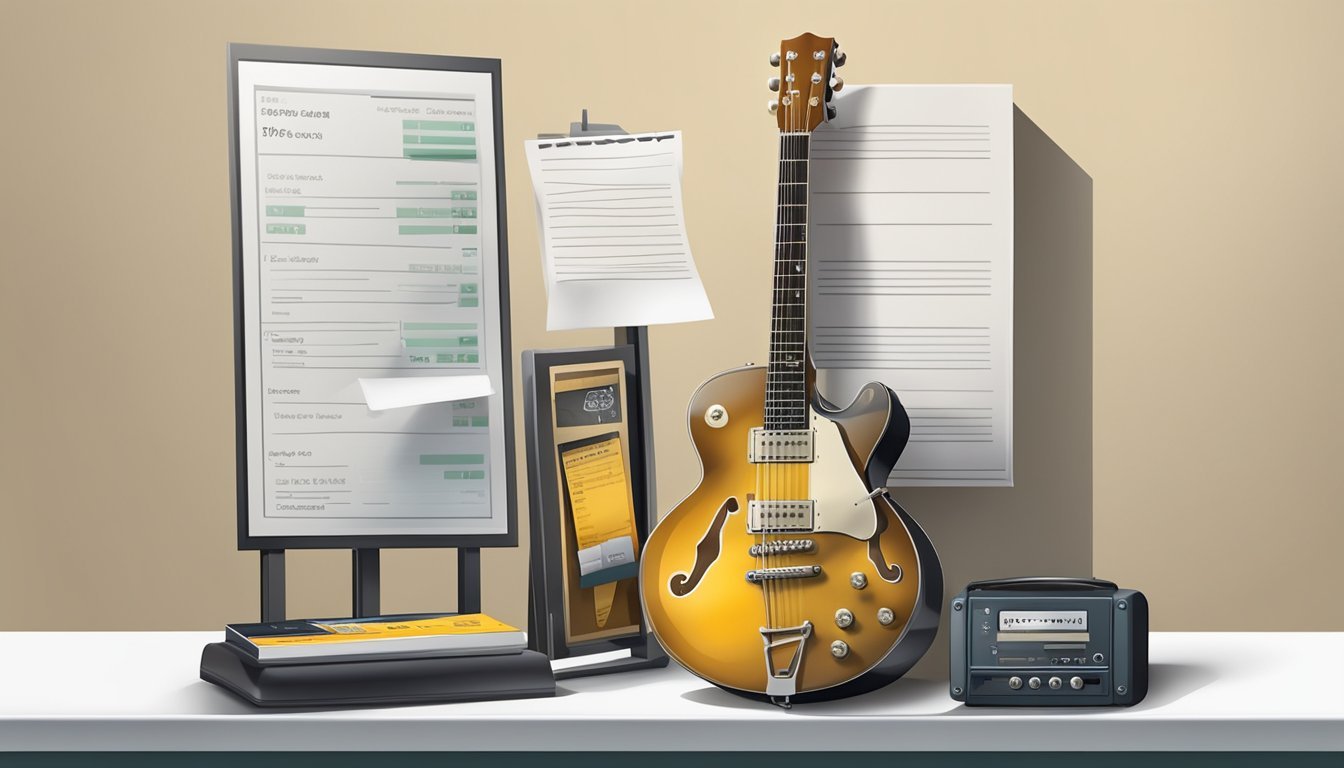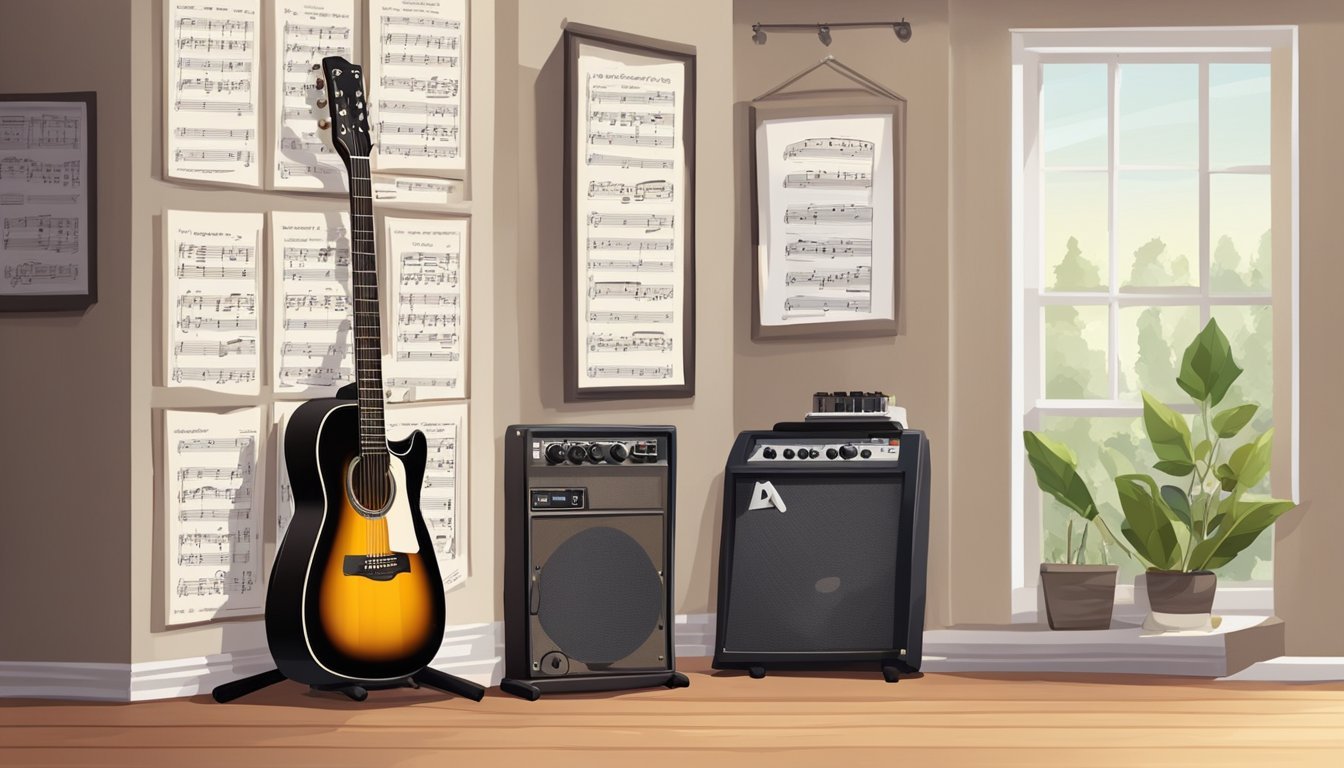Guitar lessons can improve your skills, whether you’re a beginner or looking to advance your playing.
The cost of guitar lessons typically ranges from $20 to over $100 per session.
Factors like lesson length and whether you choose online or in-person options affect the price.
Knowing what to expect can help you budget and find the best approach that suits your learning style.

Aside from the basic lesson costs, there are additional expenses to consider.
Materials for music theory or tools to practice guitar chords and scales are some examples.
As you explore your options, you might also wonder if those lessons are worth the investment.
Understanding the full picture will help you make the right decision for your guitar journey.
Key Takeaways
- Guitar lesson prices vary widely, typically from $20 to over $100 per session.
- Additional costs may include learning materials and practice tools.
- Investing in lessons can significantly enhance your guitar skills and knowledge.
Exploring Guitar Lesson Options
When choosing a guitar lesson, you have several options to consider.
Each option has its own benefits and fits different needs and preferences.
Here’s a closer look at in-person versus online lessons, group sessions versus private lessons, and various teaching environments.
In-Person vs Online Lessons
In-person lessons offer hands-on guidance from a teacher.
You benefit from immediate feedback, which is great for developing your technique and posture.
Many local guitar teachers provide tailored lessons to help you progress.
On the other hand, online lessons are becoming more popular.
You can learn from professional guitar instructors anywhere, often at a lower cost.
These lessons often include video tutorials, which allow you to learn at your own pace.
Websites like TakeLessons and even platforms associated with Guitar Center can connect you with skilled teachers.
Group Sessions vs Private Guitar Lessons
Group sessions tend to be more affordable, often ranging from $10 to $30 per hour.
They give you a chance to learn with others and share tips.
This can make learning more fun, but you might not receive personalized attention.
Private guitar lessons are generally more expensive, with costs between $25 and $100 per hour.
These lessons focus solely on you, allowing for customized instruction.
If you’re serious about mastering the guitar, private sessions might be the way to go, especially if you have specific goals in mind.
Schools and Tutors
Music schools, like School of Rock, offer structured programs that can be very beneficial.
They often have a set curriculum that helps ensure you cover all the important skills.
Additionally, learning with peers can create a motivating environment.
Alternatively, finding a local tutor can give you flexibility.
Tutors might offer lessons in your home or in a nearby studio.
The individual attention can help you develop a unique style and technique that fits you best.
Regardless of your choice, make sure the instructor understands your goals and learning style to maximize your progress.
Understanding Guitar Lesson Costs

Guitar lesson costs can vary based on different factors.
Knowing about pricing structures, lesson lengths, and potential extra fees will help you plan your budget.
Pricing Structures
Guitar lesson prices depend on several factors.
You can expect to pay anywhere from $20 to $100 per session.
Private lessons tend to cost more, usually around $40 to $100 per hour.
Group lessons are generally cheaper, with many working out to $15 to $30 per student.
Some places offer package deals, like four 60-minute lessons for $250 or four 30-minute lessons for $125.
Look around at different instructors to find what fits your budget best.
Lesson Lengths and Frequency
Lesson length has a big impact on the cost.
Most guitar lessons are offered in 30-minute or 60-minute slots.
If you only have half an hour, expect to pay around $25 to $35.
For an hour lesson, the average price is about $70.
Consider how often you want to take lessons, too.
Some people might go once a week, while others prefer twice a month.
The frequency can change your budget, so think about what works for you and your schedule.
Registration Fees and Other Extras
Some music schools and studios charge a registration fee, usually around $30.
This fee often covers materials and administrative costs.
Keep this in mind when you’re comparing prices.
Also, pay attention to any extras that might pop up.
For example, you may need to buy specific books or materials.
Ask your instructor about any additional costs upfront so you’re not surprised later.
Additional Expenses to Consider

When you take guitar lessons, it’s not just the lesson cost that adds up.
There are other important expenses to think about.
Here are some key factors that can affect your total investment in learning the guitar.
Buying an Instrument
Before you start lessons, you’ll need to buy a guitar.
Prices can range widely based on the type and brand.
An entry-level acoustic guitar can cost between $100 and $300.
If you prefer an electric guitar, you may spend $200 to $500 or more.
Don’t forget to account for accessories like a guitar strap and a tuner.
A strap is usually around $15 to $25, while a decent tuner costs about $10 to $30.
If you don’t have your own guitar, these expenses are necessary to start learning.
Maintenance Costs
Your guitar will need regular maintenance to keep it in good shape.
This includes changing strings, tuning, and basic repairs.
Strings can cost $5 to $20 for a set, depending on the quality you choose.
If you’re not comfortable doing maintenance yourself, consider taking it to a professional.
Routine setups and repairs can cost $25 to $75.
Regular maintenance ensures your instrument sounds its best, making your practice time more effective.
Travel and Convenience Factors
Think about where your lessons are held.
If you’re traveling to a studio, transportation costs can add up.
Gas money or public transport fares can range from $5 to $20 per trip, depending on your location.
Online lessons might save you money on travel, but don’t forget about your internet costs.
Ensure that your connection is reliable for a smooth experience.
Consider the convenience of lesson times, too.
Flexible scheduling with instructors can impact how often you can practice, which could affect your overall learning process.
Maximizing Your Guitar Learning Experience

To get the most out of your guitar lessons, it’s important to focus on the right tools and strategies.
Choosing the right guitar and genre can enhance your practice.
Additionally, effective techniques and online resources can support your self-learning journey.
Finding a reliable instructor or online course can also provide structure and guidance as you learn.
Whether you prefer traditional lessons or digital platforms, these resources can clarify how to start playing guitar effectively.
Remember to set realistic goals and regularly review your progress to stay motivated on your musical journey.
Choosing the Right Guitar and Genre
Starting with the right guitar is key to your learning.
If you prefer folk or rock, the acoustic or electric guitar can fit your style.
An electric guitar might suit you better if you love solos and rhythm sections.
Also, consider your favorite music.
Different genres require different techniques.
If you enjoy blues, you’ll need to practice bending notes and playing with emotion.
Try out different types of stringed instruments like bass guitar, mandolin, or even ukulele to find what excites you most.
Practice Techniques and Progress Tracking
Effective practice techniques can make a big difference.
Consistency is important; aim for at least 20-30 minutes daily.
Break your sessions into focused segments.
For example, spend 10 minutes on warm-ups, followed by 10 minutes working on guitar tabs.
Track your progress by recording your practice sessions.
Listen to them to note your improvements.
Consider setting small goals, like learning a specific song or solo.
This will keep you motivated and provide a sense of achievement.
Use a combination of recorded lessons and live instruction to diversify your skills.
A good teacher can highlight areas for improvement, while recorded lessons can let you learn at your own pace.
Online Resources and Self-Learning
The internet is full of resources that can supplement your lessons.
Platforms like YouTube offer countless free trials and lessons.
You can learn everything from strumming patterns to advanced techniques.
Joining forums or social media groups for guitar enthusiasts can keep you inspired.
Sharing your learning experiences can also help you stay accountable.
DIY resources can help customize your learning style.
Explore apps that provide guitar tabs and exercises tailored to your skill level.
This can be a great way to practice guitar outside of formal lessons and immerse yourself in your chosen genre.
Frequently Asked Questions
You probably have a few questions about guitar lesson costs.
Here’s a look at some common queries that can help you understand what to expect.
What’s a typical price for beginner guitar lessons?
For beginner guitar lessons, prices can range from $20 to $50 per hour.
Many instructors offer packages or group sessions that might be more affordable.
It’s a good way to get started without breaking the bank.
How much do most folks shell out for adult guitar lessons?
Adult guitar lessons generally cost between $30 and $60 per hour.
The price can vary based on the instructor’s experience and location.
Some adults prefer longer sessions, which can affect the total cost.
Is it more expensive to have guitar lessons at a place like Guitar Center?
Lessons at places like Guitar Center can be pricier, often ranging from $40 to $100 per hour.
This is due to their quality instructors and the convenience of being in a well-known music store.
You might pay a little more for the environment and expertise.
Can you learn to play guitar without a teacher, or do lessons make a big difference?
You can definitely learn guitar on your own using online resources or tutorials.
However, having a teacher can provide personalized feedback and faster progress.
Lessons can help you avoid developing bad habits early on.
What’s the going rate for a standard guitar lesson?
The going rate for a standard guitar lesson is typically between $30 and $60 each time.
The final cost is influenced by factors like the lesson length and the teacher’s qualifications.
You might also find discounts for booking several lessons at once.
Do guitar lesson prices vary a lot from one city to another?
Yes, guitar lesson prices can vary significantly between cities.
Larger cities usually have higher rates due to demand and cost of living.
In smaller towns, you might find better deals or more affordable options.

